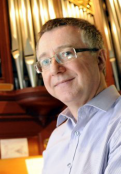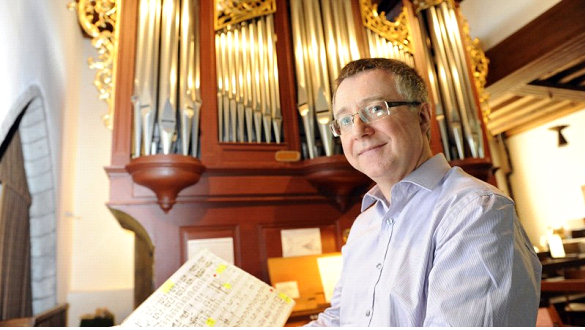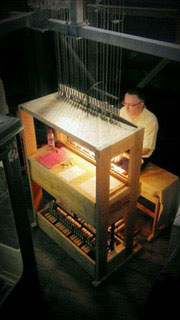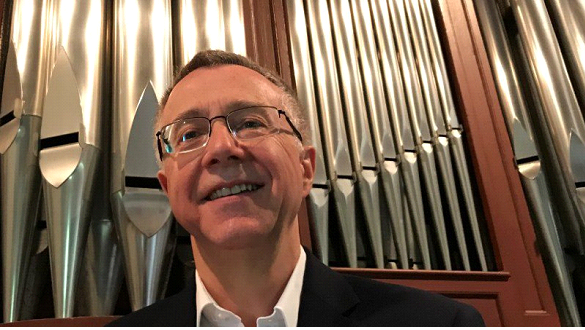
Interview with Henri-François Vellut by Nayoung Kim Millius, May 2023
 .
.
Could you tell us about your first encounter with the organ? How did you decide to pursue the path of a professional musician?
I began piano lessons at the early age of four, but I remember that I always wanted to play the organ. I don’t know why. It was an instinctive choice. I had been introduced to organ music by my parents, who had many CDs.
Soon I was taking lessons on both the piano and the organ and replacing my teacher for church services.
As a career, I studied engineering, but when I received my diploma in that field, I returned to my true passion, music. What was envisioned as a one -year program of musical studies, in Germany, turned into three unforgettable years. I particularly remember a Masterclass in Bayreuth where I met Marinette Extermann, a Swiss musician who, in turn, introduced me to Lionel Rogg. Because of that encounter, I went to Geneva and studied organ for two years with M. Rogg.
What is the greatest attraction of this instrument for you?
For me it is the diversity of the instrument, whether it is the visual impact of each individual organ, the enormous range of sound that it can produce, or the extensive choice of repertoire.
In addition, each organ is conceived so differently, that any given piece of music will not sound the same, giving the organists an unlimited possibility of interpretation.
What are the principal difficulties that you encounter as an organist? (Technical problems, programming, organizational and professional challenges?)
Many organists are active in other careers in addition to their role as a musician. Sometimes it is difficult to find a good equilibrium between two professions, because one’s time is limited.
In planning a concert program, one really needs to find a central theme that ties all the individual pieces together, so that the program is a coherent whole. This takes time and a lot of research.
Tell us a bit about your program for the AOA concert, does it imply a particular meaning that you wish to share with the audience?
The organ in the Auditoire dates from 2013-2014 and its main aesthetic is Baroque. After playing the organ for several hours so that I could get to know it better, I decided to choose pieces that were written in the same years as the organ was installed, compositions that were equally baroque in style, or copies of the Baroque style; imitations, if you like.
My program begins with Gaël Liardon, a Swiss composer, who unfortunately died five years ago at a young age. He greatly admired the early master composers, such as Sweelinck, Pachebel and Bach. Liardon, himself, composed many pieces for organ, for chamber ensembles and for organ and choir.
Next on my program will be a Partita by François Delor, a reknown musician and the former organist of the St. Pierre Cathedral. The Partita is a series of variations on a well- known chorale, often sung in protestant church services; a great work that evokes the music of Böhm and Bach.
My last piece will be a set of three dances by the Dutch composer, Margaretha Christina de Jong, using 14thc-15thc dance forms: Saltarelle, Sicilienne and Fandango.
What is your opinion on the role of organists and musicians for the younger generations?
Organ music, far from being confined to the sacred walls of our churches, should be celebrated in any site worthy of its grandeur. Certainly, Europe has an extensive number of organs in churches, but there exists a large repertoire of secular works for the organ free from a spiritual connotation. Unfortunately, those that have not been touched by the magic of organ music only associated it with funeral dirges, music that is a reminder of the most tragic times in their lives.
This is rather a simplistic view of the organ. In our capacity as dedicated organists we should try to enlarge this limited view and present the organ in all its splendor. It’s true, organ music can be melancholic and meditative: but it can also be joyous, rhymical and even funny!
So let the notes of the organ resound in our churches and outside their walls, so that the music touches each and every heart.
 .
.
What, in your opinion is the role of organists and musicians via the younger generation? What impact will your musical activities have for them?
We could present film concerts, for example like the series: www.orgue decinema. or even activities for children such as: Orgelkids, www.orgelkids.nl/en or show children the inner workings of the organ.
Let’s continue our efforts to unveil the hidden and mysterious aspects of the organ in order to make the instrument more accessible to the public.
Perhaps we will succeed in breaking down the prejudice that an organ concert is boring and difficult, by making people discover and appreciate different styles of music, and by stimulating their desire to not only listen to it but to play it, thus revealing all the fascinating potential of this instrument.
A last word for the public of the Festival Souffle de Printemps ?
Make organ music known, make this festival that you appreciate, known, in a simple way and without reservation, share what you experience. Discover and help others to discover new aspects of this instrument. Share your enthusiasm and your joy.
 .
.